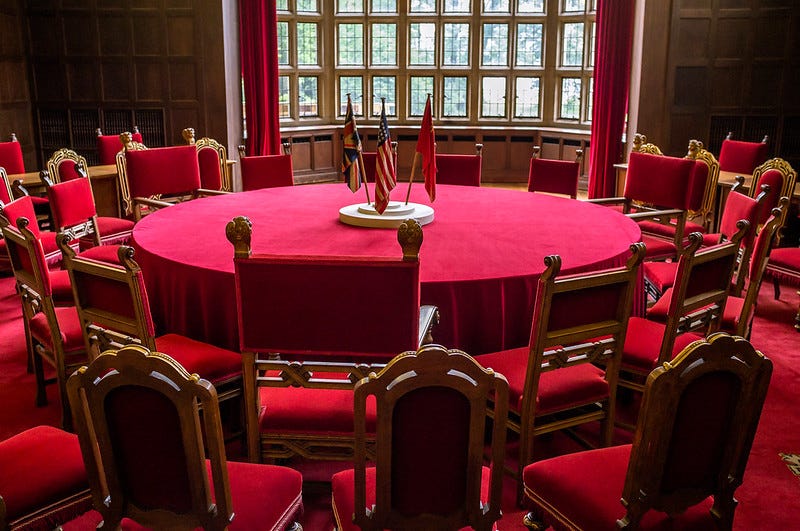On July 17, seventy-eight years ago this week, British Prime Minister Winston Churchill, U.S. President Harry Truman, and Soviet leader Joseph Stalin met in Potsdam, Germany, to determine the shape of the world order following the Axis Powers’ defeat towards the end of the Second World War.
The Allies had defeated Nazi Germany two months earlier, but discussion remained about settling Europe’s fate and defeating Imperial Japan, which continued to fight despite the loss of all its allies.
Potsdam was the war’s last Allied conference, following on the heels of other famous Allied meetings at Casablanca, Tehran, and Yalta. Many new faces were present at this occasion, including President Truman, who had replaced the late Franklin Delano Roosevelt after his death that April. British elections were taking place at the time of the conference, so Churchill himself was sadly replaced midway through by the new prime minister, Clement Attlee.
One of the conference’s pressing issues was Germany’s fate. The Soviets insisted on imposing heavy reparations on the Germans as punishment for starting the war and for the war’s devastation of the Soviet Union, which had lost more than twenty million soldiers and civilians to the Nazi invasion, or almost 14 percent of its entire population.
The British and Americans, however, resisted this harsh policy, knowing they needed a strong, democratic Germany as a bulwark against the Soviet Union’s expansionist, imperialistic impulses.
The Western Allies were also worried that grinding down Germany could lead to future revanchism. After all, the victors’ hard treatment of Germany after the First World War gave rise to resentment and serious economic troubles that propelled the Nazi Party into power.
In the end, each of the victorious nations was permitted to take what reparations they wished from their occupied areas. This led to a more lenient reparations policy in Allied-occupied Western Germany, and a draconian policy in Soviet-occupied East Germany, where the Soviets “had already begun dismantling industrial centers and shipping entire factories to the Soviet Union.” Soviet soldiers were encouraged “to take anything as booty, including items with no military or economic utility”.
The Allies also embarked on a far-reaching denazification program to purge Germany of all remnants of the Third Reich. Their mission, to “drastically remake German society, by repealing laws passed by the Nazi regime and removing Nazis from the German education and court systems, and to arrest and try Germans who had committed war crimes,” succeeded.
The Western Allies’ denazification laid the ground for Germany to become a modern, democratic state, though East Germany remained another forty years under a communist dictatorship.
Tragically, East Germany was not the only country to fall to the communists.
The Soviets’ military presence in Eastern Europe was overwhelming. They did as they pleased, which meant installing tyrannical communist dictatorships wherever Soviet boots were present.
That’s what made the question of Poland so thorny during the Potsdam discussions. The country had suffered enormously during the war, getting crushed between the Nazis and Soviets and losing up to six million of its people, half of whom were murdered Jews.
The U.S. and Britain insisted that Poland’s legitimate, democratic government, exiled in London for the war’s duration, resume its rightful place as Poland’s leaders. Stalin, however, insisted on establishing what was, in effect, a puppet communist regime that would expand the Soviet orbit to include Poland. Stalin’s claim, that his troops had “liberated” Poland, ignored the fact that the Soviets helped start the war by carving up Poland with Adolf Hitler, before the Führer backstabbed his Soviet allies.
Stalin got his way, and an oppressive communist dictatorship dominated Poland until the 1980s, when it was taken down by Lech Walesa’s Solidarity trade union—ironically, a workers’ movement that rebelled against the communist “workers’ paradise.” Poland’s suffering under socialism was a tragic harbinger of what would happen to the rest of the states beyond the Iron Curtain that fell under Soviet-imposed communist control, including Romania, Hungary, Bulgaria, and Czechoslovakia.
Finally, the Allies needed to defeat Japan. The Allies—minus the Soviet Union, which had not yet entered the war against Tokyo—issued the Potsdam Declaration, calling on Japan to surrender unconditionally. At this point, America had already developed the nuclear bombs that would fall on Hiroshima and Nagasaki shortly afterwards. When Truman announced to Stalin that America had a “new weapon of unusual destructive force,” Stalin didn’t seem surprised—in fact, the Soviet dictator’s spies had already informed him of the top secret Manhattan Project.
One of Potsdam’s main agenda items was convincing Stalin to join the war against Japan, something he promised to do. He would put his promise into effect only weeks later, launching a massive invasion of Japanese-occupied Manchuria in northeastern China with more than one million troops, completely overwhelming the Japanese soldiers.
Though enlisting Soviet aid may have seemed like a wise plan, it was unnecessary and counterproductive. Bombing Hiroshima and Nagasaki likely would have brought Tokyo’s capitulation even without Soviet intervention. But now that the Soviets were in the war, they gained a chance to expand their sphere of influence even further.
The Soviets had used Manchuria as a staging ground to support Mao Zedong’s communist forces that were plotting to seize control of China. They helped solidify Chinese communist control over Manchuria and delivered weapons and supplies to Mao’s troops, as well as providing them with training. Soviet aid helped bring the Chinese Communist Party to power in China—which it rules to this day with an iron fist.
Soviet troops also invaded Japanese-held northern Korea, giving Stalin free reign to do as he wished with the country, just as he did in Poland and Eastern Europe. Stalin installed the military officer Kim Il Sung into power, who founded the infamous and monstrous communist Kim dynasty that still rules North Korea, and which has murdered millions of its own people.
The Potsdam conference was a meeting of major historical consequences. It set the stage for the Cold War as the Soviet Union solidified its control over half of Europe behind the Iron Curtain. Its legacy for world history is mixed. It ensured Germany would never again become a brutal, conquering military power, instead becoming a democratic nation. But it also empowered the Soviet Union, leading to the establishment of tyrannical communist dictatorships in Europe, China, and North Korea, some of which still remain. In many ways, the echoes of Potsdam reverberate to this day.







